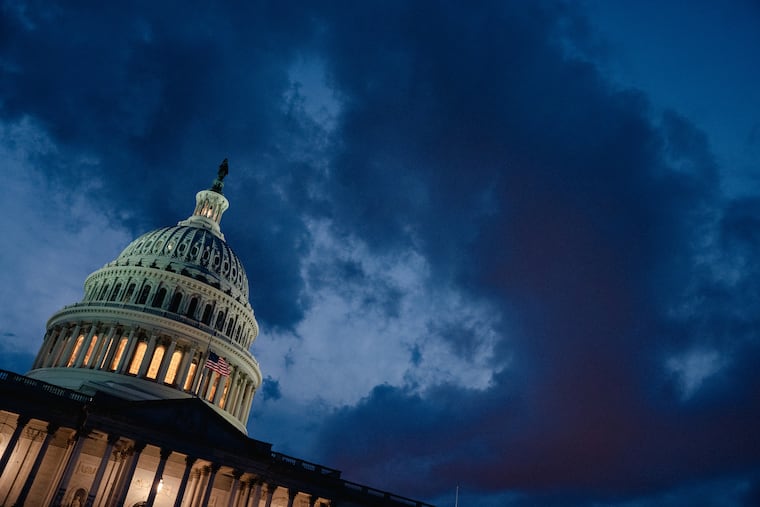The Inflation Reduction Act won’t reduce inflation
To stop inflation, we must demand lawmakers act to reduce government as a burden — not expand it.

If you think inflation is sufficiently painful, gird your loins. The Biden administration is about to foist the “Inflation Reduction Act” upon us. The euphemistic name belies the high price we are going to pay for a likely political panacea rather than a policy solution.
The new spending bill is helpful — if you’re willing to give up more of your disposable income to higher taxes: It doubles the size of the Internal Revenue Service and pours $300 billion into climate solutions and something called “environmental justice” (which actually seems very unlikely to advance the cause of either the environment or justice).
It is also likely to drive up the cost of doing business. The bill levies tax hikes and onerous regulations against manufacturers, which will restrain supply, diminish production, and increase prices.
The University of Pennsylvania Wharton Budget Model estimates that the Inflation Reduction Act will fail to live up to its name — having no impact on lessening inflation. Other estimates indicate that the measure will increase budget deficits in its early years. And the bill’s promise to lower drug prices is not only unlikely to do so — it could also keep more than 340 new drugs from making it to market over the next two decades. Guess who will be paying for that with both our salaries and well-being?
In Pennsylvania, Gov. Tom Wolf is looking to pile on. His last-ditch attempt to redeem his legacy by offering $2,000 stimulus checks to every Pennsylvania household making less than $80,000 will cost us far more. How much more of our take-home pay are we willing to give for these “feel good” bills that not only fail to solve the problem but also exacerbate it?
Government spending at this level helped drive inflation. When the government poured trillions of dollars into the economy in the form of COVID-relief stimulus, people were incentivized not to work or were being compensated at a far greater level than the goods and services they were putting into the marketplace. That created a higher demand for fewer goods. Prices soared.
Economist Lawrence Summers warned about this in 2021 before a massive COVID-19 stimulus package was passed. The former Clinton administration treasury secretary and senior adviser to President Barack Obama noted that “there is a chance” that the stimulus “will set off inflationary pressures of a kind we have not seen in a generation, with consequences for the value of the dollar and financial stability.”
To address inflation, the president needs to let the Fed do its job and allow the market to reorient itself. Then, three things must happen.
First, Congress must vote to remove unnecessary regulations stifling energy production. President Joe Biden’s moratoriums are driving these high prices. The world would be less impacted by the war in Ukraine if America did more to develop our own oil and gas. Biden’s plan to heal the Earth cannot come at the expense of working families trying to pay bills.
Second, urgent reform is needed by the Food and Drug Administration to lower prices and eliminate barriers that would keep important innovations from getting to market. Congress should authorize multiple private certification bodies to compete directly with the FDA, a model that the European Union already uses. The EU’s structure is why we were able to get baby formula from Europe — but only after the FDA took three months to issue guidance on relaxing imports, which further delayed the actual arrival of formula on the shelves.
We must maintain consumer safety for products as important as baby formula and insulin. But research from the Cato Institute shows that in many cases, government intervention leads to less safe outcomes for patients. The sheer cost of new drug approvals — in 2019 dollars, it’s estimated that the average cost of approval has risen from as much as $1.8 billion in 2000 to $3.2 billion in 2013 — has made it prohibitive to develop and bring new drugs to market, reducing the number of manufacturers and driving the price of drugs up.
Third, legislative action is required at the state level. Since Gov. Wolf’s first budget in 2015, general fund expenditures have grown by $10.6 billion — an increase of about 35%. Growing government without growing the tax base is a bad idea in ordinary times, and a terrible one at the beginning of a recession. That’s why state lawmakers should advance the Taxpayer Protection Act (TPA) to restrict government spending increases based on inflation, population, and personal income. It would keep government spending in line with families’ ability to pay. If the TPA had been enacted in 2004, research by my colleagues at the Commonwealth Foundation shows that a family of four would have now saved more than $17,000.
» READ MORE: Pennsylvania’s next governor will face a looming budget deficit
The solution for Americans suffering under government intervention is not to increase the level of intervention. Nor is the answer allowing our president to gaslight us, as he did last week when he said inflation was “zero percent.” Considering that the typical American family paid an extra $718 in inflation-driven costs through the first half of the year, it is not an exaggeration to say we can’t afford more.
To stop inflation and prevent this type of economic agony again, we must demand lawmakers act to reduce the burden of big government — not expand it.
Jennifer Stefano is the executive vice president of the Commonwealth Foundation and a fellow at the Independent Women’s Forum.